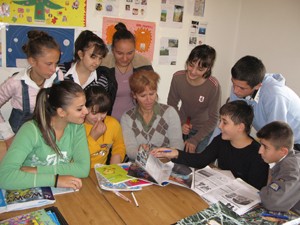
After an automobile accident several years ago, Teuta Halilaj’s life changed. In a moment, her whole environment became accessible only from a wheelchair and her self-confi dence dwindled. Then she realized, “If you want life to smile for you, you must smile fi rst. We women with disabilities must make that fi rst step and change our fate.”
Smile she did, becoming a voice for people with disabilities in Tirana. As an active member of the Albanian Disability Rights Foundation, supported by USAID, Halilaj was chosen to represent Albania in the Women’s Institute on Leadership and Disability, winning a tuition scholarship to the American English Institute in Eugene, Oregon.
While studying in Eugene, she participated in activities like scuba diving and sailing, things she never thought possible for a woman in a wheelchair. She was also encouraged by the accessibility of classrooms and other university amenities for people with disabilities. For the fi rst time, she saw an interactive educational model where she was able to give presentations and actively direct her learning. She became determined to bring that opportunity to students in Albania.
Halilaj now teaches private English classes to more than 50 students, including some with disabilities. She says, “English is a key that opens a world of possibilities. People with disabilities face seclusion and exclusion. By learning English in combination with access to the Internet, communities can be formed, conversations can begin, voices can merge, and change can happen. Though Albania does not currently have the infrastructure to allow most people with disabilities access to interactive education, I am trying to show my students that through awareness, tolerance, advocacy, and learning English, lives, laws, and communities can change.”
Halilaj recently had a ramp built onto her teaching facility and has been making contact with families who have students with disabilities. With the help of USAID, Halilaj has not only strengthened her own voice and the voice of the disability community in Albania, but she has also passed that power on to her students. “I do not limit myself. I am now loud and proud,” she said.







Comment
Make a general inquiry or suggest an improvement.